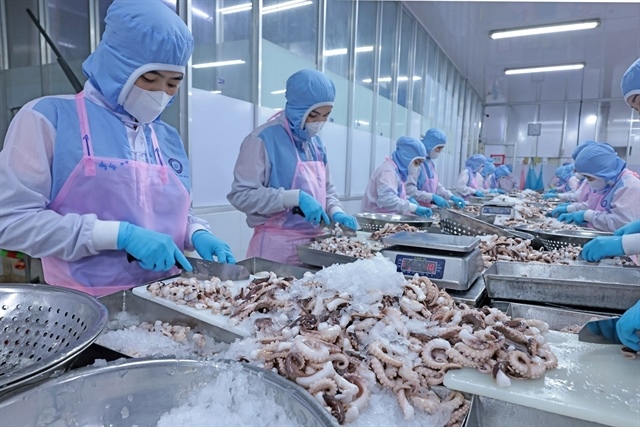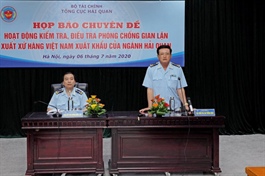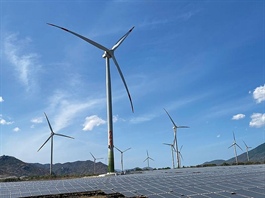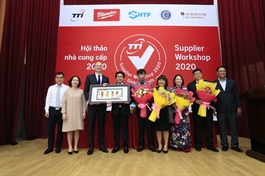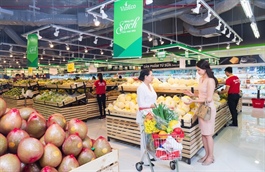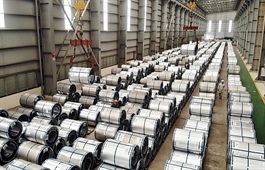Dabaco delays rectifying lasting pollution debacle
Dabaco delays rectifying lasting pollution debacle
Facing allegations of discharging untreated waste into the environment, Dabaco Tuyen Quang has admitted mistakes and pledged that the company would make improvements in supervision of the workflow and employees’ performance – but failed to set a specific timeline.
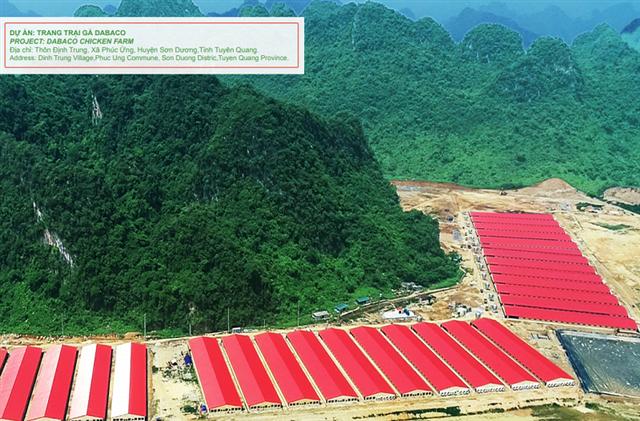
Dabaco delays rectifying lasting pollution debacle
|
In a discussion with VIR about the air pollution caused by a farm of Dabaco Group JSC, a multi-field group specialising mainly in animal feed, cattle, and poultry breeding as well as food processing, reported last week, Duong Van Chu, director of Dabaco Tuyen Quang Breeding Pig Co., Ltd., did not deny the issue. He said that the waste treatment system of the farm includes three huge biogas tanks (thousands of cubic metres each), along with a sump tank, settling tank, and filter tank.
“After settling and filtration, the pig manure is pressed into dry manure, which will be sold to locals to fertilise plants,” Chu said.
The company also mixes probiotics into pig feed to make the manure less odorous.
Explaining the stench that the locals of Hop Hoa commune complained of in recent weeks, Chu assumed responsibility and said that he would carefully look through the workflow and the performance of all staff. “There were probably some mistakes in the workflow, like workers did not clean pigsties properly or the wrong dosage of probiotics were added to the feed. I will look into this,” Chu promised.
According to Chu, the farm’s waste treatment system was designed to be able to handle the farm’s maximum designed capacity. However, there are only 1,200 sows, 20,000 pigs, and 15,000 gilt pigs, equivalent to about 70 per cent of the maximum capacity.
He said that the farm and the company office were built solidly and are not yet affected by depreciation. “Dabaco also conducted a serious environmental impact assessment before building the farm, under the supervision and inspection of the provincial government,” Chu added.
Although the director reaffirmed that the farm’s waste treatment system is running at the proper capacity, this is not the first time that locals have complained of air pollution. Last year, after several weeks of suffering the stench of pig manure, local complaints prompted the dispatch of an independent observation team from Hanoi to inspect the air quality around Dabaco’s farm.
“The observation team reported at the end of last February that all indices were within the acceptable limit,” the director of Dabaco Tuyen Quang said, showing the report to VIR.
However, as the company begins to head back towards maximum capacity, it is looking to request more land from the provincial government to accommodate 3,000 more sows in the coming years. This means the air and river pollution may become worse if workflow issues and waste treatment systems are not properly worked out.
While the locals are unsure of benefits the company is generating for Tuyen Quang, they are aware of the tremendous after-tax profit that Dabaco has reported thanks to the increasing price of live hogs. In the first half of the year, the group gained VND744 billion ($32.35 million) in profit, 27 times as much as in the year before and surpassing the annual plan by 63 per cent.
If Dabaco continues to focus more on profitability than the safe operation of its large-scale farms, pollution incidents like Tuyen Quang could be a recurring problem of growing severity and impact on the health of locals – an especially concerning thought in light of the relatively low penalties for discharging wastewater.
These fines are now only about 0.1-0.2 per cent of the profit the group made in the first half, which is not deemed a large enough deterrent.
|
Decree No.155/2016/ND-CP on penalties for administrative violations against regulations on environmental protection Article 13. Violations of regulations on discharge of wastewater containing non-hazardous environmental parameters into the environment: - Penalties for discharging wastewater from 1.1 to less than 1.5 times the permissible limit prescribed in the technical regulation on waste or less than 1.1 times repeatedly are up to VND300 million ($13,000); - Penalties for discharging wastewater from 1.5 to less than three times the permissible limit are up to VND700 million ($30,400); - Penalties for discharging wastewater more than three times the permissible limit go from VND950 million ($41,300); and - Additional penalties include up to 12 months of suspension of business activities. Article 14. Violations against regulations on discharge of wastewater containing hazardous environmental parameters into the environment - Penalties for discharging wastewater from 1.1 to less than 1.5 times the permissible limit prescribed in the technical regulation on waste or less than 1.1 times repeatedly are up to VND400 million ($17,400); - Penalties for discharging wastewater from 1.5 to less than three times the permissible limit are up to VND850 million ($37,000); - Penalties for discharging wastewater more than three times the permissible limit, except for environmental crimes, are up to VND1 billion ($43,500); and - Additional penalties include up to 12 months of suspension of business activities. Article 15. Violations against regulations on discharge of dust and emission containing non-hazardous environmental parameters into the environment - A warning shall be imposed for emitting unpleasant odours into the environment, discharging dust and emission less than 1.1 times the permissible limit; and - Penalties for emitting unpleasant odours into the environment, discharging dust and emission from 1.1 to 1.5 times the permissible limit or less than 1.1 times repeatedly are up to VND800 million ($34,800). |






